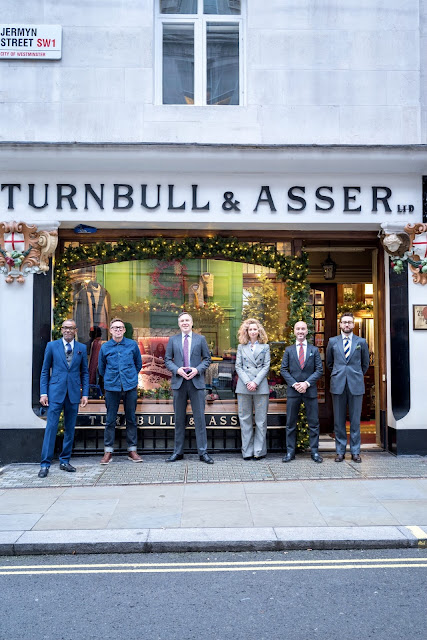https://turnbullandasser.co.uk/
Turnbull
& Asser is a British shirt-maker that was established in 1885. The company
has its flagship store on Jermyn Street in the St James's area of London, and
its bespoke store around the corner on Bury Street. Turnbull & Asser also
has a location at 4 Davies Street in Mayfair. In addition to the three London
stores, the company has a shop in New York City.
History
The
business was founded in 1885 by John Arthur Turnbull, a hosier and shirt-maker,
at 3 Church Place, St James's. Turnbull met Ernest Asser, a salesman, later on
in 1893. Together, they opened a hosiery under the name "John Arthur
Turnbull" in St James's located in England. As the neighborhood was the
site of numerous gentlemen's clubs and high-end haberdashers, the business
flourished. The name was changed to "Turnbull & Asser" in 1895.
In 1903,
after continued success, Turnbull & Asser moved to its present location at
the corner of Jermyn Street and Bury Street. In 1915, during World War I,
Turnbull & Asser developed a raincoat which doubled as a sleeping bag for
the British military. It is known as the Oilsilk Combination Coverall & Ground
Sheet.
Between the
1920s and the 1970s, Turnbull & Asser grew its London business from a
haberdashery to a clothier, expanding into sportswear, clothing (both bespoke
and ready-to-wear), and ready-to-wear shirts. As its symbol, it used a hunting
horn with a "Q" above, which it called the Quorn, a name it shares
with one of the oldest hunts in England. Many of Turnbull & Asser's
articles were called by this name, such as the popular "Quorn scarf".
During the
1960s, Turnbull & Asser was known for catering to the Swinging London set,
with vibrant colors and modern designs. In 1962, Turnbull & Asser began to
outfit the cinematic James Bond as first portrayed by Sean Connery, whose dress
shirts had turnback cuffs fastened with buttons as opposed to cufflinks,
referred to as "cocktail cuffs" or "James Bond cuffs".
In the
1970s and 1980s, Turnbull & Asser began reviving some of the more
traditional aspects of its business. The company found that Americans
increasingly were buying its wares, so it began offering trunk shows at the
Grand Hyatt in New York City. Beginning in 1974, Turnbull & Asser sold
ready-to-wear shirts in the United States through department stores Bonwit
Teller and Neiman Marcus. For a brief period beginning in 1979, Turnbull &
Asser even operated a small store in Toronto. Turnbull & Asser also opened
a location in Beverly Hills in 2003 before closing several years later.
In February
2018, Turnbull & Asser posted a £1.2 Million pound loss, leading to a £1m
equity injection from its owner, Ali Fayed.
Royal
Warrant
Charles III
has bought shirts from Turnbull & Asser since his youth. When, in 1980, the
then Prince of Wales was granted the power of bestowing royal warrants, his
first issue was granted to Turnbull & Asser. He also wears Turnbull &
Asser suits, made by the former Chester Barrie factory in Crewe, Cheshire.
Following the retirement of Paul Cuss, the Royal Warrant was passed down to
Steven Quin, who currently heads the bespoke department in Bury Street.
Today
Shirts and
ties are still made in its Gloucester factory.
In addition
to its retail stores, the company hosts seasonal bespoke shirt trunkshows in
key cities around the world, including Los Angeles, Chicago, Toronto, Mumbai,
Seoul, Tokyo, Singapore, Hong Kong and more.
In response
to the COVID-19 pandemic, Turnbull & Asser dedicated its Gloucester
workroom to making medical-grade uniforms for National Health Service
personnel.
BUSINESS
Profits slip slightly at Royal shirt-maker Turnbull
& Asser
Turnbull
& Asser has made shirts for members of royalty, world leaders, entertainers
and captains of industry
By Joanna
Bourke
28 November
2018
Shirt-maker
Turnbull & Asser might count Prince Charles as a client but even royal
patronage can’t protect it from High Street woes.
The St
James’s firm, founded in 1885, on Wednesday admitted that “the general trading
environment was tough last year and continues to be so”.
The
business — owned by Ali Fayed (younger brother of former Harrods boss Mohamed
Al-Fayed) and his sons — posted a £1.2 million loss for the year to February 3,
compared with a £1.1 million loss a year before.




No comments:
Post a Comment